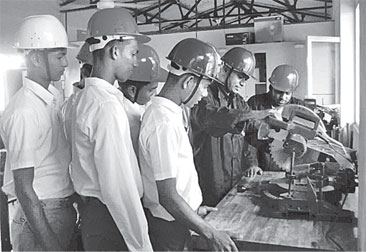|
Govt, private sector should play a key role:
Increasing the employability of youth
By Lionel WIJESIRI
Kithsiri is in his final year in university and expects to get good
results when he sits his exams in a few months. His expectations for his
future prospects, however, are much lower. Speaking over the phone, he
acknowledges that his chances of securing a job when he leaves
university are slim.
“There will be so many Arts graduates leaving university at the same
time,” he says, “and we will all be chasing after the few positions that
might be available.” Looking for a job is a familiar plight to thousands
of young educated people throughout the country.
However, according to the latest Central Bank statistics, the
unemployment rate continued to decrease to 4.2 percent in 2011 from 4.9
percent in 2010.
This unemployment rate in Sri Lanka is relatively low when compared
with other countries. On a list of countries ranked in order of their
rate of unemployment in the World Fact Book published by the US Central
Intelligence Agency, Sri Lanka ranks 42nd out of 200, and is far ahead
of most Western countries.
However, on the flip side, the unemployment level among youth aged
25-29, is as high as 18 percent. This is something we have to sit up and
take note of.
Reasons
Since the early 2000s, the Sri Lankan labour market has been changing
– mostly for the better.
It is much more dynamic and flexible, yet protection measures for
workers against exploitation and abuse are stronger. Overall, young
people are better educated than at any time in our history.
So why is youth unemployment high? Of course, all unemployment has
one thing in common: A lack of demand for workers. Let us take a few
examples:
|

Youth at a job fair |
Automation replaces many routine jobs, not just in developed
countries. It is happening here too;
Our universities are too slow to change. It takes them many years to
change their courses. By then technology would have changed yet again;
The education system can be held accountable, failing to give
youngsters the skills that are needed for jobs in advanced economies;
Life skills, or rather the lack of them pose a problem. Some
youngsters don't know even the basics, from getting on with co-workers
to having basic entrepreneurial skills;
It's a theme that comes up again and again: Businesses, universities
and schools, government and non-governmental organisations fail to talk
to each other about what they need and what they can deliver;
Ultimately, the problem comes down to demand for jobs.
Challenges
However, it's not just about Government, private employers too have
responsibilities; not to reject young people who want to work just
because they lack experience or job-specific skills, to provide access
to good quality training and invest in their workforce. Young people too
have a responsibility, to make good use of the support that is on offer.
It is obvious that high youth unemployment and growing skill
shortages are the two important challenges currently facing the labour
market. Why not use one problem as the basis of a solution to the other?
In a labour market facing growing skill shortages, youth could become an
even more valuable source of qualified workers.
Current difficulties in finding work are, and should, send a signal
to young people to invest in their own skills. This would help them
qualify for a job and contribute to filling the shortages in workers
supply, especially among high-skilled occupations.
In the long run, tailoring youth training to match skills that are in
short supply would help alleviate skill shortages. If there were greater
communication and coordination between employers and schools and
universities and more skills-specific training programs incorporating
apprentice and internship opportunities, young Sri Lankans would be in a
better position to gain the skills needed to find a job. In Germany, for
example, the apprenticeship system combines on-the-job training with
formal education, and therefore, allows students to gain concrete work
experience while completing their education programs.
|

Vocational training can help check unemployment figures |
Considering youth as potential skilled workers should be a key
element of a renewed strategy for tackling skill shortages. Not only is
it easier to train and acquire skills at an early age, but the
investment in human capital will generate a longer payback period - for
the individuals and the economy.
With high youth unemployment, now is the right time to strengthen and
implement appropriate training strategies. Policy-makers, educational
institutions and potential employers should strike while the iron is
hot.
Outdated curriculum
One of the critical reasons behind youth unemployment could be the
current education system in the country being unsuitable for meeting the
requirements of the job market, in terms of both curriculum content and
requirements of the job market. Considering that this problem has
persisted for over 40 years, it is appropriate to ask why our tertiary
education system is outmoded and outdated.
While access to higher education is a worthy objective, more thought
should have been put into what is to become of the thousands of students
who cannot enter the universities. In this context, some educationists
recommend that university entrance should perhaps be restricted
according to the availability of the job market, so as to avoid
frustration and dissatisfaction among students who spend three to four
years earning their degrees only to find it an almost futile endeavour
upon completion, when they are unable to secure employment.
All things considered, unemployment is a complex problem. From an
unemployed graduate’s point of view, years of studying, in some cases
under very difficult conditions is in vain and becomes useless when
years after earning a degree, a suitable job remains out of reach.
On the other hand, from an employer’s perspective, a degree is not an
automatic qualification for a job, especially when the skills and
competencies required are lacking. The question of whose responsibility
it is to ensure the employment and employability of graduates is
debatable.
Responsibility
In the long run, the State and private sector have a responsibility
to ensure that a feasible environment will be created which will help
bring enough investment so that it will ultimately afford our youth an
opportunity to improve their lot. Both should pursue such policies that
equally help promote poor and middle-class people.
The history of the world bears witness to the reality that the
nations which promoted its poor and middle-class people have gained in
development and achieved a brighter future for their youth.
One of the holistic solutions lies in dedicating to the promotion of
agriculture and industry. These can help improve the efficiency of the
country in multiple ways. If our country makes some successful strides
in reaping the advantages of agriculture and industry, there would be
more employment for our youth.
In the meantime, the Government should help the youth to be
self-employed by providing them with micro and macro-level loans. Loans
should be provided with accessible conditions. Such conditions should be
easier to comply with by the aspiring youth.
In the long-term, policies must be created that specifically target
young workers. For example, continued investment in educational access
for young people is something that has been encouraged by the policy
community for years. Further, engaging larger numbers of young people in
vocational training or higher education removes individuals from the
labour market, bringing unemployment figures down. Any durable solution
for the youth unemployment problem must at least address university
graduation rates and access to higher learning or vocational training. |

